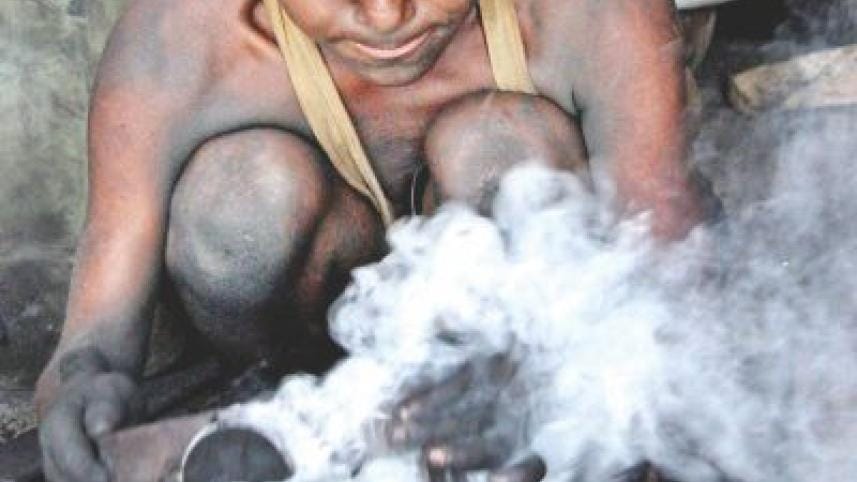Children and Poverty

That children are especially vulnerable to adversities of all kinds including poverty of the family or the community is well-known. Even in a rich country like the United States, 22 percent of children under 18, more than one in five, live in poverty, estimates the National Center for Children in Poverty at Columbia University's School of Public Health. Its research, not surprisingly, shows that poverty impedes "children's ability to learn and contribute to social, emotional, and behavioral problems" and "risks are greatest for children who experience poverty when they are young."
China, on track to surpass the US as the largest economy in the world in a decade, is concerned about the price of economic development paid by children. The argument is that protecting and promoting children's well-being must figure prominently in poverty reduction efforts; otherwise, children end up being short-changed.
The China Development Research Foundation (CDRF) teamed up with the Asian Regional Network for Early Childhood Development (ARNEC) to convene an international conference in Beijing last month, during October 21-24. The theme was "Transforming Power of ECD for Equitable Development." CDRF is the research arm of the State Council of China (equivalent to the Cabinet of Ministers in Bangladesh).
Among the invitees were early childhood development policymakers, practitioners, and activists from 33 countries. Bangladesh was represented by a strong delegation of 18 members led by the Minister of State for Women and Children Affairs Meher Afroze Chumki. The team included officials, members of the civil society and NGO representatives. This writer, as the chair of the Bangladesh ECD Network (BEN), had the privilege of attending the conference.
The organisers of the conference lined up a bevy of Nobel Laureates in economics–James Heckman, Amartya Sen and Joseph Stiglitz– to make the case for attention to children in fighting poverty. These world renowned scholars joined the conference by video link-up.
Heckman, known for his advocacy for investment in young children, made the non-economist argument for soft skills (rather than just cognitive knowledge), attitudes and values that must be formed early for later success in life. "Efforts should focus on the first years for the greatest efficiency and effectiveness… when the brain develops rapidly to build the foundation of cognitive and character skills necessary for success in school, health, career and life," asserted Heckman.
"Protecting the rights of children and providing the essentials for their development must be part of the definition of poverty reduction," said Stiglitz, stressing the toll that inequality takes on society, especially on children. "Having succeeded in rapid economic growth and poverty reduction, China now faces the challenge of growing inequality, affecting large numbers of children," stated Stiglitz.
UN Secretary-General Ban Ki Moon, in his message to the conference, said, "China has achieved transformational results having reduced poverty on an unprecedented scale, and improved education, health, gender equality and women's empowerment." To secure and to take these gains further, rights and development of children have to be given priority, emphasised the Secretary-General. He noted the inclusion of this priority in the Sustainable Development Agenda (SDG 2030), particularly in Goal 4 on education and child development, proclaimed by world leaders at the UN in September.
Chinese speakers including Vice Premier Liu Yandong, proud of their economic success, pointed out that economic progress also imposed a toll on children. "As many as sixty million children have been left behind with their grandparents, deprived of parents' care and love, when the parents move to faraway cities seeking better earning opportunities," it was noted.
Minister Meher Afroze in her plenary speech drew attention to the vulnerability of Bangladesh and other low income countries to climate change effects. "This vulnerability places their people including children in poverty and danger," said Ms Afroze. "In planning adaptation and mitigation measures for climate change, protecting children from hazards and creating the conditions for their development have to be given higher priority than given so far."
Ms Afroze said that a comprehensive early childhood development policy was adopted in 2013 by Bangladesh. She noted, "But we face many obstacles in implementing the policy – constraints in resources, capacities, old habits in governance and management practices, which must be overcome."
Jeffrey Sachs, the adviser to the UN Secretary-General on SDG, reminded the conference that the comprehensive and ambitious SDG 2030 agenda is achievable. "We now have to bring together technology, resources, partnerships, synergy and commitment within countries and across countries," Sachs said. "We have heard many times that investment in children is the best investment we can make. We must do it now."
In Bangladesh, in spite of poverty and capacity constraints, remarkable progress has been made in achieving child development objectives in health and education set in the Millennium Development Goals for 2015. Now the SDG agenda for 2030 has to be elaborated for Bangladesh and pursued with vigour. We owe it to our children and ourselves, not to fail, and to rise up to this challenge.
The writer is Professor Emeritus at BRAC University and chair of the Bangladesh ECD Network.

 For all latest news, follow The Daily Star's Google News channel.
For all latest news, follow The Daily Star's Google News channel.
Comments